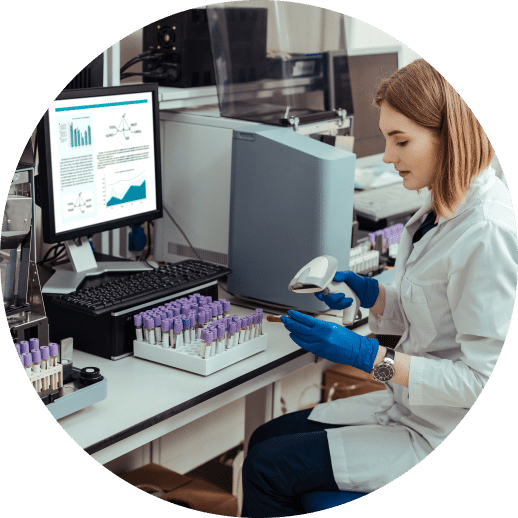Transformation Projects
ctDNA in the NHS
Expanding use of ctDNA in the NHS: pilot in Non-Small Cell Lung Cancer

Project background
Currently, most somatic cancer testing in the National Genomic Test Directory requires a tumour sample for testing through multi-target panels, small variant detection or structural variation detection.
It is becoming increasingly possible to use blood samples to test the circulating free DNA (cfDNA) for the presence of small fragments of DNA (called circulating tumour DNA [ctDNA]) released by tumours into a patient’s bloodstream. This is also known as liquid biopsy testing.
Genetic testing of ctDNA can help us understand a patient’s cancer, including identifying the type of tumour and which treatment may be most effective, and also help monitor a patient’s response to treatment or enable early detection of relapse. This minimally invasive technique avoids the need for a direct tissue sample from the tumour which can be valuable if a patient is too ill to be able to withstand an invasive procedure or solid biopsy is infeasible or undesirable. Usually, the test is complimentary to routine tissue testing. ctDNA analysis is more rapid than tissue molecular testing and has a lower failure rate than routine use tissue.
Pilot data suggests that ctDNA increases the number of patients with advanced NSCLC molecularly suitable for targeted therapy and reduces the time to treatment decision-making and results in faster treatment commencement.
Project overview
The North Thames GMS, in partnership with North East and Yorkshire GMS, is running a national pilot study to investigate the use of ctDNA in patients presenting with suspected stage 3/4 NSCLC in the NHS.
The project will provide evidence for the feasibility of a nationally commissioned ctDNA testing pathway, including the healthcare economics case. This activity will be monitored for quality, turnaround times, the scope of testing, onward management of patients, the impact it has on speed of treatment and treatment selection and health economics.
This could markedly improve the molecular diagnosis of patients living with advanced lung cancer by enabling more rapid and more effective treatment, and reducing drug wastage of regimes less likely to benefit patients. In the North Thames, approximately 100 patients will have an opportunity to take part in the project, with data from the project taken forward in a single national analysis of data from all GMSA regions.
Although this pilot is being run in NSCLC, we hope that the learnings will be able to be rolled out across further cancer types as appropriate.
Resources & further reading
Read the UK report about what has been learnt from our liquid biopsy pilots:
The Liquid Experience: From Research to Reality (August 2024)
- Thompson JC, Aggarwal C, Wong J, et al. Plasma Genotyping at the Time of Diagnostic Tissue Biopsy Decreases Time-to-Treatment in Patients With Advanced NSCLC—Results From a Prospective Pilot Study. JTO Clinical and Research Reports 2022;3(4):100301.
- Cui W, Milner-Watts C, O’Sullivan H, et al. Up-front cell-free DNA next generation sequencing improves target identification in UK first line advanced non-small cell lung cancer (NSCLC) patients. European Journal of Cancer 2022; 171:44e54
- Leighl NB, Page RD, Raymond VM, et al. Clinical Utility of Comprehensive Cell-free DNA Analysis to Identify Genomic Biomarkers in Patients with Newly Diagnosed Metastatic Non–small Cell Lung Cancer. Clin Cancer Res 2019;25:4691–700
- Roy Castle Lung Cancer Foundation: https://roycastle.org/
- Oncogene-Driven Lung Cancer Patient Alliance UK: odlcpatientalliance.co.uk
Key contacts
Paul Ryves
Programme Director North Thames GMSA
Local clinical project lead: Professor Sanjay Popat, Consultant Medical Oncologist at The Royal Marsden, Professor of Thoracic Oncology at the Institute of Cancer Research.
For more information on this project please contact us via Paul.Ryves@gosh.nhs.uk.